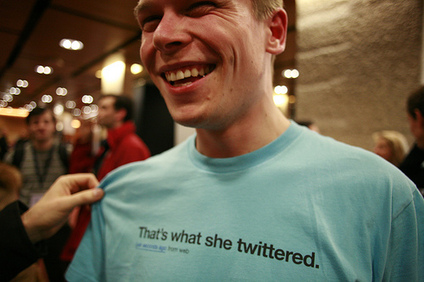Since 2009, tweets are getting less happy
The average happiness of English-speaking Twitter users peaked in April 2009 and has been trending downward ever since, according to new research from the University of Vermont.
As PsychCentral reports, the researchers analyzed over 46 billion words written in tweets by 63 million Twitter users around the globe over the last three years. They then used Amazon’s Mechanical Turk service to find online volunteers, having them rate the average happiness of the 10,000 most common words in English. For example, the volunteers rated “laughter” at 8.50, “food” 7.44, “truck” 5.48, “greed” 3.06 and “terrorist” 1.30.
The University of Vermont scientists then created a happiness graph, which shows happiness falling.
“After a gradual upward trend that ran from January to April 2009, the overall time series has shown a gradual downward trend, accelerating somewhat over the first half of 2011,” the researchers write in the Dec. 7 issue of the journal PLoS ONE.

“It appears that happiness is going down,” said Peter Dodds, an applied mathematician at UVM and the lead author on the new study.
Perhaps as interesting as the results is the very fact that UVM researchers devoted years to the study of happiness. In the study, they say, “Individual happiness is a fundamental societal metric,” noting that the “ultimate goal of much public policy is to improve and protect happiness.” A happiness measurement tool could ostensibly take regular measures of happiness in near real-time—thus immediately impacting public policy, marketing, and other fields.
“We get a sense of the aggregate expressions of millions of people, while they are communicating in a more natural way,” adds Chris Danforth, a mathematician and a co-author of the study.
Happiness Ebbs and Flows
The study demonstrates that happiness generally peaks over the weekend. Happiness also tends to drop from morning to night: “It’s part of the general unraveling of the mind that happens over the course of the day,” said Dodds.
The happiest days are holidays like Christmas and Valentine’s Day, but “all the most negative days are shocks from outside people’s routines,” Dodds said. These drops are globally tied to events like swine flu, the U.S. economic bailout, the tsunami in Japan, and the death of actor Patrick Swayze.
The researchers are quick to add that feelings change quickly and the nature of happiness is one of the most complex, profound issues of human experience.
“There is an important psychological distinction between an individual’s current, experiential happiness and their longer term, reflective evaluation of their life,” they write in the study, “and in using Twitter, our approach is tuned to the former kind.”
“By measuring happiness, we’re not saying that maximizing happiness is the goal of society,” Dodds concludes. “It might well be that we need to have some persistent degree of grumpiness for cultures to flourish.”
Image: ![]() Some rights reserved by Robert Scoble
Some rights reserved by Robert Scoble

